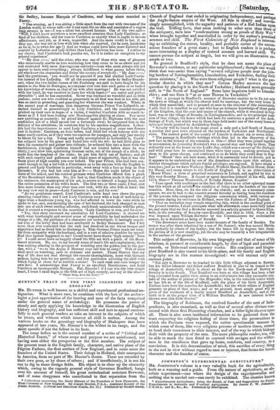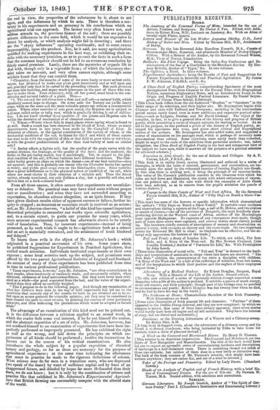JOHNSTON'S EXPERIMENTJIL AGRICULTURE. * MR. JOHNSTON'S volume is a very valuable
bqok for the agriculturist, as a warning and a guide. From tli9 nature of agriculture, an ab- solute --periment—one where the design of the experimentalist and nothing else is carried out—can rarely be exhibited. The chemist knows • Experimental Agriculture; being the Resett of Past and Suggestions for Future Experiments In Scientific and P•xictical Agriculture. By James F. W. Johnston, F.R.SS.L. and E., &c., Re. Published by Blaeciyood. -tie end in view, the properties of the substances he is about to act urn, and the influences by which be acts. There is therefore a cer- tainty in his experiments and an accuracy in his conclusions which no • agricultural trial can approach. The farmer very often knows not, and seldom attends to, the previous history of the soil ; there are possibly minute differences in the same field, which it would be too expensive to detect by analysis, or which analysis might fail in detecting ; and there are the "skyey influences" operating continually, and to some extent imperceptibly, upon the produce. Nor, be it said, are many agriculturists qualified for making experiments in the best way, or exhibiting their re- sults with the necessary 'precision, so as to present the facts in such a form that the common inquirer should not be led to an erroneous conclusion by falsely stated premises. Lastly, there are the mysteries of organic life to deal with, though only in a vegetable form; of which the laboratory che- mist takes no account, and very often cannot explain, although some
sciolists boast that they can control them.
" Chemistry, from the mouths of some of its more hasty or more ardent culti- vators, has promised to make any plant grow luxuriantly and at will upon any soil, provided only that it be suited to the prevailing climate. But such promises are mere idle boasting, and argue much ignorance on the part of those who ven- ture to make them. Even chemistry, with all her power, must bend to the con- stitution and natural habits of a plant. Thus— "1. The oat and the red cloverlove a firm and stiff soil—a natural habit, which chemistry cannot hope to change. On seine soils the Tartary oat yields heavy crops, while on the same soil the more valuable potato oat refuses a remunerative return. Where other varieties of oats grow sound, the Hopeton oat is subject to a disease called sedge or tulip root, which is gradually driving it out of cultiva- tion. I do not know whether these qualities of the potato and Hopeton oats be within the dominion of mechanical or of chemical causes.
"2. Wheat.—Winter wheat fails in many places where spring wheat is found to do well. Such a result has been observed in the island of Islay, where so many improvements have in late years been made by Mr. Campbell of Islay. Is chemistry or climate, or the special constitution of the variety of wheat, or the mechanical condition of the soil, to blame for this? and which of these causes has most to do with the capability of this or that field to grow white or red wheat, or with the greater productiveness of this than that variety of seed on similar soils?
"S. Barley affects a lighter soil; but the quality of the grain varies with the natural dryness, the drainage, or the quality of the land; and the maltster, the feeder, or the pot-barley maker, buy it accordingly. Yet, in regard to the phy- sical condition of the soil, different varieties have different tendencies. The Che- valier barley grows on clays on which the Annat—one of our best varieties—does not succeed; and this is probably one reason why the Chevalier barley has spread so widely, and yields good crops even on the Huntingdon clays. Some varieties show a great indifference as to the physical nature or condition of the soil, while others are moat choice in their selection of a suitable soil. Thus the Annat variety, already mentioned, not only dislikes a clay, but a gravelly soil also, and thrives best on a dark-coloured loam."
From all these causes, it often occurs that experiments are unsatisfac- tory or delusive. The practical man may have tried some without proper care or consideration ; and when they have not succeeded according to expectation, he abandons science altogether, as an ignis fatuus. If they have given distiuct results either of apparent success or failure, further in- quiry is stopped ; an incorrecteer uncertain result is received as an axiom ; and, as Mr. Johnston observes, "a-belief of this kind has caused important theoretical principles to encumber our works upon scientific agriculture, and, to a certain extent, to guide our practice for many years, which more accurate experimental research has afterwards shown to be utterly void of foundation. Thus, by incorrect experiments—instead of being promoted, as by such trials it ought to be—agriculture both as a science and an art is materially restrained, and the attainment of truth hindered and delayed."
To lessen these evils is the object of Mr. Johnston's book ; which originated in a practical movement of his own. Some years since, be published Suggestions for Experiments in Practical Agriculture, that excited much attention. Individuals instituted expetiments at their own expense ; some local societies took up the subject, and premiums were offered by the two parent Agricultural Societies of England and Scotland. An account of many of these experiments has been published from time to time in various professional publications.
" These experiments, however," says Mr. Johnston, "are often contradictory in their results, often incorrectly or carelessly made, and occasionally exhibit, when criticized, evidences of total untrustworthiness. But they have never been criti- cized as a whole—the good separated from the bad, and the value of the experi- mental data they afford us candidly weighed.
" This I propose to do in the following pages. And though my examination of what has hitherto been done in the way of field experiment has led me to the conviction that scarcely any of the results we have as yet obtained are to be re- lied upon as secure grounds for scientific opinions, yet they may he considered to have cleared the path to surer results, by pointing out sources of error previously unknown, and thus indicating the precautions which must be adopted in future trials."
The advantage of an examination of this kind need not be pointed out. It is the difference between a criticism applied to an actual work, in which the reader feels some real interest, if he be not himself the author, and the abstract exposition of a set of rules. Mr. Johnston, however, has not confined himself to an examination of experiments that have been im- perfectly performed or improperly presented. He has exhibited the right as well as the wrong, and laid down the principles on which ex- periments of all kinds should be performed ; besides the instructions he throws out in the course of his critical examinations. He also Introduces the whole subject by a popular exposition of chemical botany and geology, so far as these are necessary for the purpose of agricultural experiment; at the same time indicating the allowances that must in practice be made to the rigorous deductions of science. What science may do for men in a transition state, who are depressed (we speak of the mass) by want of sufficient capital and by fears of an exaggerated future, and deluded by hopes far more ill-founded than their fears, we do not know ; but it is only by the combination of science and practice like that exhibited in Mr. Johnston's Experimental Agricul- ture that British farming can successfully compete with the altered state of the world.



























 Previous page
Previous page